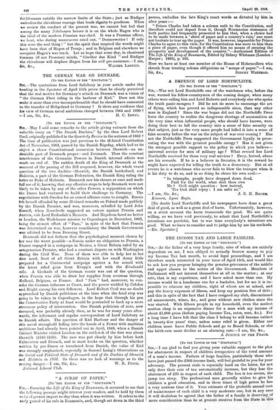THE " NIBELUNGENLIED " AND THE PRUSSIAN TYPE.
[To THE EDITOR OF THE SPEOTATOR."I Sta,—The Nibelungenlied (or Nibelungs Not)* is accepted by the Germans as their National Epic, their Iliad ; and I think it is interesting to note which type, of the various heroic types of character presented to us in the poem, the Prussian military leaders of modern times appear to have taken as their model. We may leave out Siegfried (or Sifrit) himself ; since, with his all but complete invulnerability, and with the extraordinary powers that he had in reserve through the possession of the Tarnkappe, it might be said that he could afford to take war as a noble sport and always to play the game. With one exception, we find the prominent characters of the Nibelungenlied recognizing, and on the whole practising, the laws of mediaeval chivalry. The Saxon and Danish Kings openly tell Gunther when to expect their attack. Gisolher is another Sir Gareth ; Volker, a magnanimous musician-warrior ; and the kindly and hospitable Riidiger, the Bayard of the poem, wins our love as well as our admiration. Among all these and such as these there stands out, solitary, one dark and sinister figure. It is Hagen of Tronjo ; lean, broad-shouldered, of grizzled beard, terrible of aspect—" eislich sin gesihene." He is, one must admit, loyal to Gunther, his King, and to Brunhild, as his Queen ; and his courage neither God nor Devil can daunt. Through these qualities he compels our reluctant admira- tion; and at the end, in his genuine appreciation of Volker's brotherlike loyalty, we can even see signs of a better nature that has been neglected and starved. But he is envious and jealous (an ancient German fault, as von Billow tells us) ; he will stoop to murderous treachery to gaias wealth and power for his King ; and even when he knows that nothing can avert the doom foretold him, he commits deeds of " frightfulness " as though ho had a fierce delight in thus expressing his nature. He it is who, with lying professions of friendship, worms out of Kriemhilt the fatal secret of Siegfried's vulnerable spot ; and then slays the unarmed hero by a coward's thrust from behind, and causes the bloody corpse to be cast down at Kriemhilt's chamber door. To him it is but a rough jest to hurl the harmless priest into the Danube flood, or to spear the Hunnish dandy on the rido back from church. His fi7.4 act in the struggle which Kriemhilt's thirst for revc.:age has brought on is to slay the child Ortlieb before his father Etzel's eyes. Li the burning hall he does not shrink from quenching his thirst in his dad comrades' blood, and in recommending this " wino " to his brother. warriors. A terrible figure 1 When all is said that can be said for him, Hagen stands for hard, godless, and inhumane strength, for • Those who are not acquainted with the Nib4un7eolie4 will ilnd a short but clear account of this poem as also of the Scandinavian Volvanyeago, In T'AS Encyclopaedia Britannia. Wagner appears to have made up a story of his owe IS suit his dramatic and musical aims ; I do not refer to his Hosea. faithlessness outside the narrow limits of the State ; just as Riidiger embodies the chivalrous courage that lends dignity to goodness. When we review the conduct of the present war, we cannot but feel that among the many Nibelungen heroes it is on the whole Hagen who is the ideal of the modem Prussian war-chief. It was a Prussian officer, we hear, who during manceuvres cried out. " Donnerwetter ! If only this were the real thing ! " but the spirit that inspired the words might have been that of Hagen of Tronje ; and in Belgium and elsewhere we amognize Hagen's war-track. Let us hope that some day, in chastened German (if not Prussian) minds, " Giselher dare Kind "and Reidiger the chivalrous will displace Hagen from his evil pre-eminence.—I am,































 Previous page
Previous page